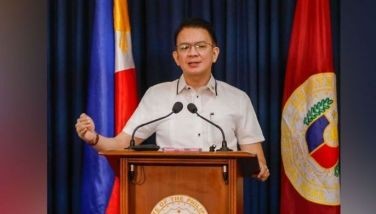Palace willing to accept 10% VAT rate
May 4, 2005 | 12:00am
Malacañang is willing to accept a value-added tax (VAT) bill that remains at 10 percent, if President Arroyo is given the authority to raise it to 12 percent, Press Secretary Ignacio Bunye said yesterday.
This acceptance could effectively break the stalemate between the Senate and the House of Representatives, locked in bicameral conference committee deliberations over the VAT bill.
"We’ve been saying all along that we can go by the end results and the end results have been spelled out by the President," Bunye said.
"The end result she is looking at will be the balancing of the budget. So if this version of the VAT will help in balancing the budget and putting our fiscal house in order, then that is something we could live with."
The House wants to raise the VAT to 12 percent, which Mrs. Arroyo is seeking, but the Senate wants to keep it at 10 percent.
The Senate proposed granting Mrs. Arroyo standby authority to raise the VAT as a compromise to break the impasse in the bicameral conference committee.
Bunye said the Arroyo administration was not necessarily dropping its bid to raise the VAT, but was merely keeping an "open mind" on the bill that Congress will eventually pass.
"What we have been saying is that our objectives are clear, and that is to raise sufficient funds. Whatever version would generate sufficient revenues to balance the budget, that will be acceptable."
As for the authority granting the President power to raise the VAT to 12 percent, Bunye said the law "will have to provide the conditions under which this standby authority will have to be exercised."
"The President said she hoped the bill would be at 12 percent. We would like to have something that will help us out of our fiscal difficulty. But for as long as we are able to achieve the same results, I guess the final form of the VAT bill will be acceptable," he said.
Although the Constitution stipulates that Congress has the sole authority to raise tax rates, the bill’s legality will be beyond question, Bunye added.
"We believe that there has been a precedent to this standby authority. And if that is what will break the impasse, I believe that we can live with that standby authority."
Sen. Ralph Recto, who heads the Senate side in the bicameral committee, said the majority of his panel favor granting the President the standby authority.
Senators were busy discussing yesterday the conditions that would enable Mrs. Arroyo to raise the VAT, Recto said, adding that he has already made a draft of the bill.
"We have the suggested language. There are certain proposals and possible amendments to the language. We want to finalize everything today."
Senators are considering three conditions or "triggers" that would authorize Mrs. Arroyo to hike the VAT: an improvement in tax collection, the ratio of the budget deficit to the country’s gross domestic product, and the setting of a timeframe.
Under the first condition, the government must show an improvement in VAT collection.
Under the second, the authority to raise the rate would be granted if the consolidate public sector deficit or the budget deficit rises to more than one percent of the country’s gross domestic product (the value of goods and services produced by the economy).
The third would allow the President to raise the rate after a pre-determined period.
Recto said the second option is considered the liberal approach because it would practically allow Mrs. Arroyo to hike the VAT right away since the chronic budget deficit is already above one percent of the country’s GDP.
Meanwhile, former budget secretary Benjamin Diokno said the bill’s standby authority provision could still face legal challenges, thereby delaying the legislation.
As a rule, raising the VAT rate should only be done through legislation, he said. — With Marvin Sy
This acceptance could effectively break the stalemate between the Senate and the House of Representatives, locked in bicameral conference committee deliberations over the VAT bill.
"We’ve been saying all along that we can go by the end results and the end results have been spelled out by the President," Bunye said.
"The end result she is looking at will be the balancing of the budget. So if this version of the VAT will help in balancing the budget and putting our fiscal house in order, then that is something we could live with."
The House wants to raise the VAT to 12 percent, which Mrs. Arroyo is seeking, but the Senate wants to keep it at 10 percent.
The Senate proposed granting Mrs. Arroyo standby authority to raise the VAT as a compromise to break the impasse in the bicameral conference committee.
Bunye said the Arroyo administration was not necessarily dropping its bid to raise the VAT, but was merely keeping an "open mind" on the bill that Congress will eventually pass.
"What we have been saying is that our objectives are clear, and that is to raise sufficient funds. Whatever version would generate sufficient revenues to balance the budget, that will be acceptable."
As for the authority granting the President power to raise the VAT to 12 percent, Bunye said the law "will have to provide the conditions under which this standby authority will have to be exercised."
"The President said she hoped the bill would be at 12 percent. We would like to have something that will help us out of our fiscal difficulty. But for as long as we are able to achieve the same results, I guess the final form of the VAT bill will be acceptable," he said.
Although the Constitution stipulates that Congress has the sole authority to raise tax rates, the bill’s legality will be beyond question, Bunye added.
"We believe that there has been a precedent to this standby authority. And if that is what will break the impasse, I believe that we can live with that standby authority."
Sen. Ralph Recto, who heads the Senate side in the bicameral committee, said the majority of his panel favor granting the President the standby authority.
Senators were busy discussing yesterday the conditions that would enable Mrs. Arroyo to raise the VAT, Recto said, adding that he has already made a draft of the bill.
"We have the suggested language. There are certain proposals and possible amendments to the language. We want to finalize everything today."
Senators are considering three conditions or "triggers" that would authorize Mrs. Arroyo to hike the VAT: an improvement in tax collection, the ratio of the budget deficit to the country’s gross domestic product, and the setting of a timeframe.
Under the first condition, the government must show an improvement in VAT collection.
Under the second, the authority to raise the rate would be granted if the consolidate public sector deficit or the budget deficit rises to more than one percent of the country’s gross domestic product (the value of goods and services produced by the economy).
The third would allow the President to raise the rate after a pre-determined period.
Recto said the second option is considered the liberal approach because it would practically allow Mrs. Arroyo to hike the VAT right away since the chronic budget deficit is already above one percent of the country’s GDP.
Meanwhile, former budget secretary Benjamin Diokno said the bill’s standby authority provision could still face legal challenges, thereby delaying the legislation.
As a rule, raising the VAT rate should only be done through legislation, he said. — With Marvin Sy
BrandSpace Articles
<
>
- Latest
- Trending
Trending
Latest




























